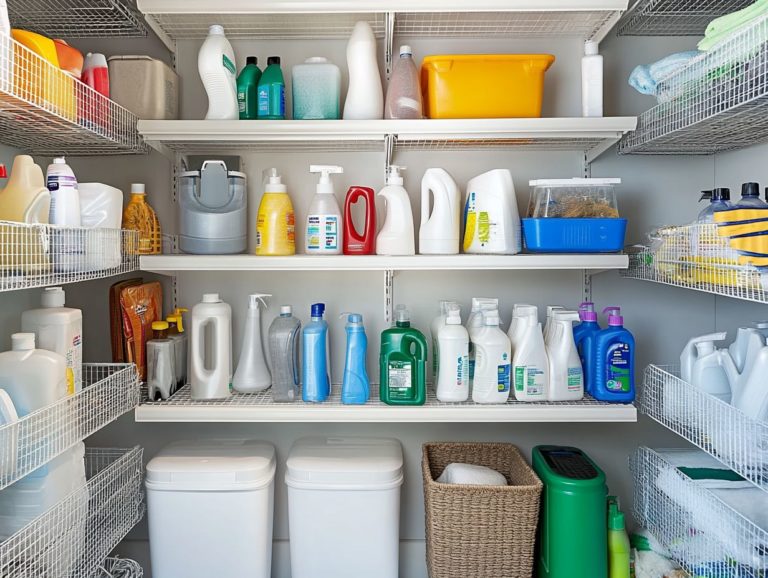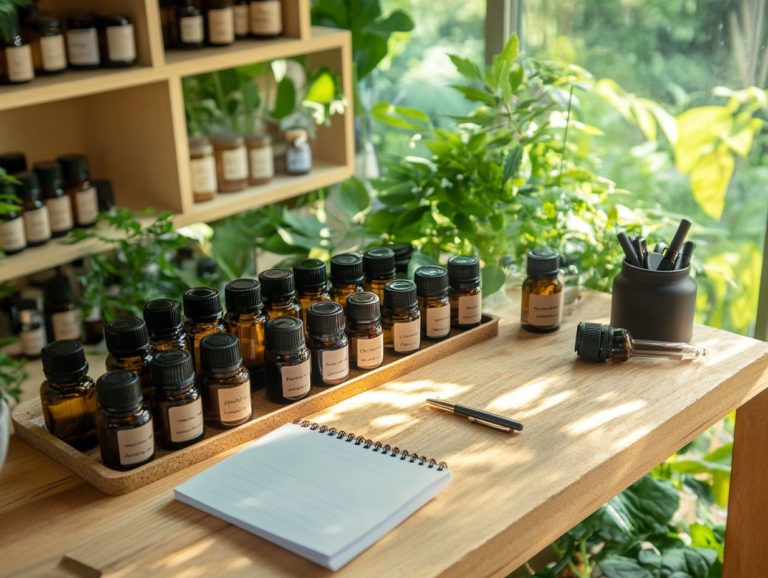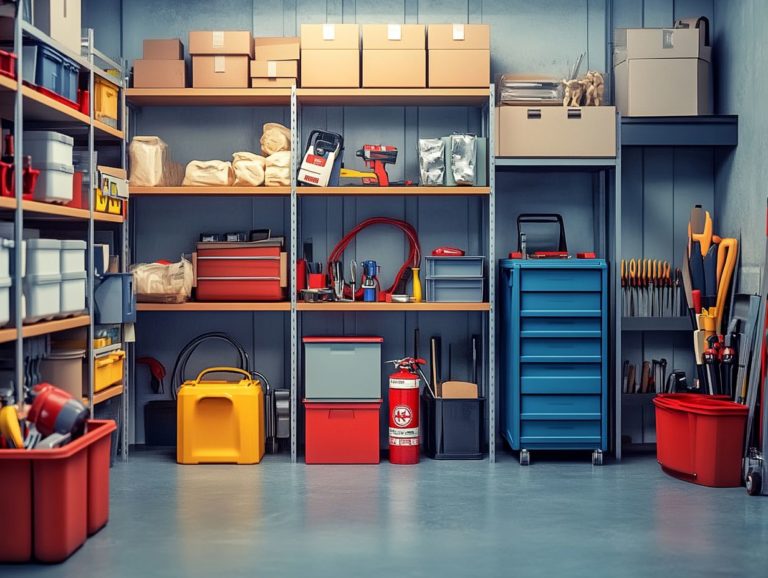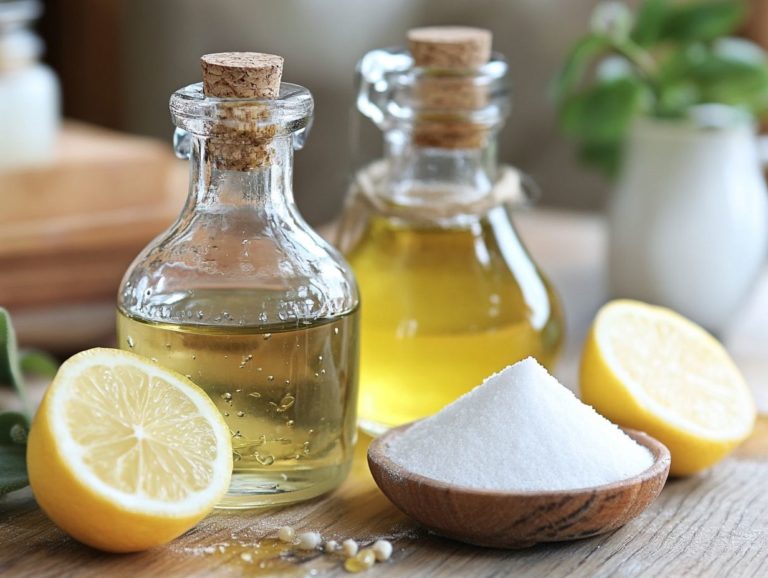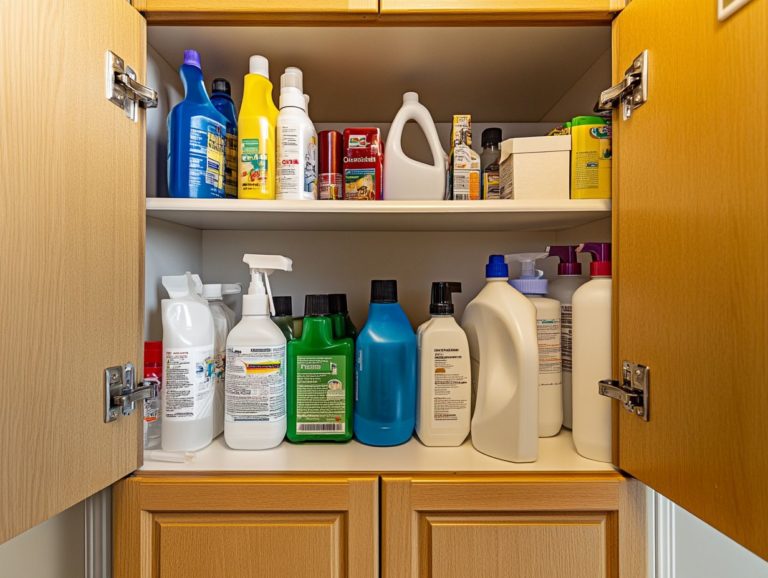How to Store Cleaners for Winter
As winter draws near, now is the time to think about how to store your cleaning products effectively. Proper winter storage not only extends the shelf life of these items but also ensures safety, particularly given the unique challenges that cold weather presents, such as extreme temperatures and temperature swings.
This guide emphasizes the significance of correctly storing both chemical and natural cleaners. You will find practical tips to keep them effective and safe throughout the season, especially in areas like your garage or basement.
From carefully reading labels to grasping essential safety precautions, you ll discover everything necessary to manage your cleaning supplies and chemicals storage with confidence and efficiency this winter.
Contents
- Key Takeaways:
- Why is it Important to Properly Store Cleaners for Winter?
- What are the Different Types of Cleaners?
- Natural Cleaners
- How to Store Chemical Cleaners for Winter?
- Read the Labels
- How to Store Natural and Chemical Cleaners for Winter?
- What are the Safety Precautions for Storing Cleaners?
- How to Properly Dispose of Unused or Expired Cleaners?
- Frequently Asked Questions
- What is the best way to store cleaners for winter?
- Can I store all types of cleaners together for winter?
- How do I ensure my cleaners are still effective after being stored for winter, especially in the garage?
- What should I do if a cleaner freezes during winter storage?
- Are there any special precautions I should take when storing cleaners for winter, including car care products like Tesla Model 3, CX-30, or Toyota Corolla?
- How often should I clean and organize my cleaners during winter storage?
Key Takeaways:
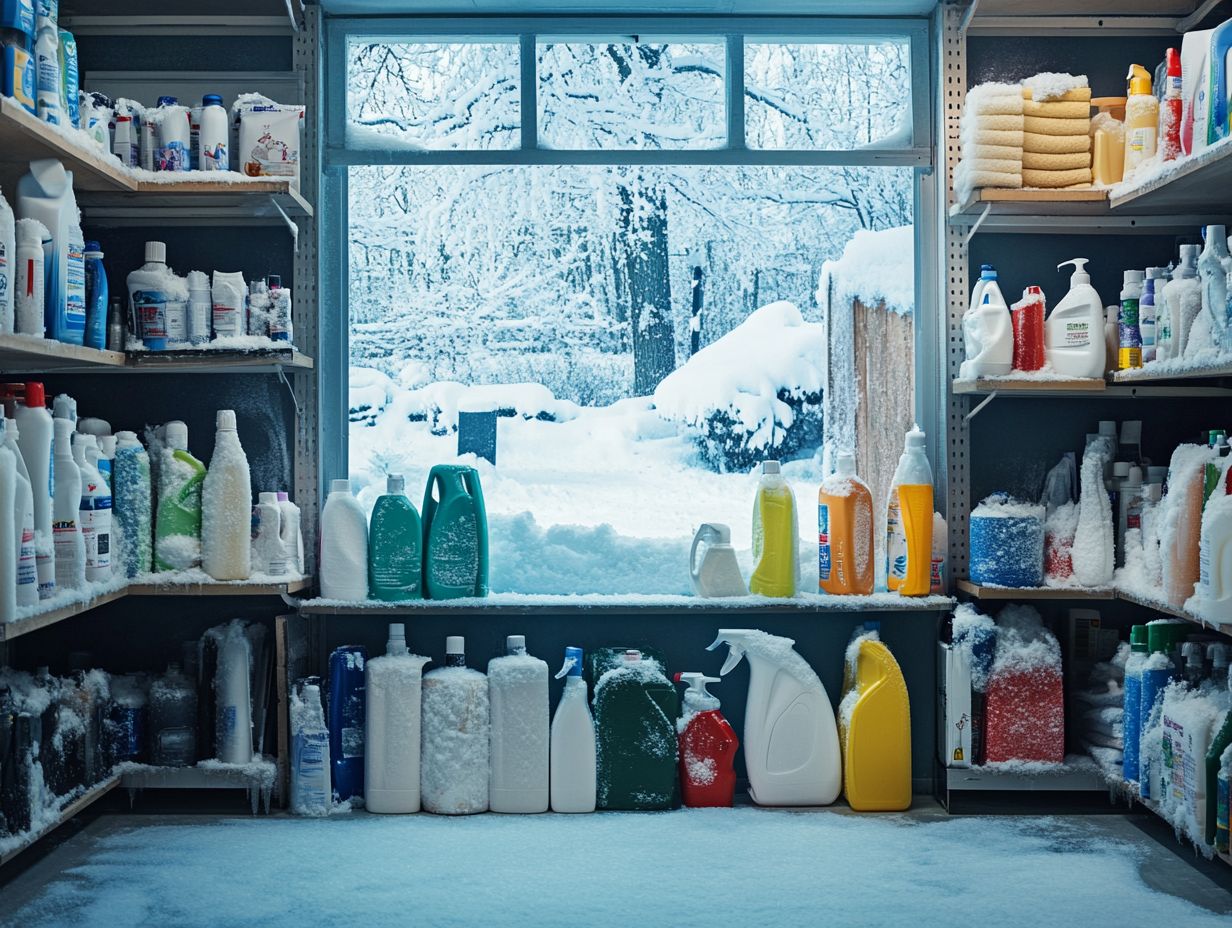
- Properly storing cleaners for winter ensures their effectiveness and longevity, especially during extreme temperatures.
- There are two types of cleaners: chemical and natural. Both require specific storage methods.
- Safety precautions should be taken when storing cleaners, including keeping them out of reach of children and pets.
Why is it Important to Properly Store Cleaners for Winter?
Properly storing cleaning supplies and chemicals during the winter months is essential for maintaining their effectiveness and ensuring safety in your home, garage, or basement. The extreme temperatures and fluctuations that come with winter can compromise the quality of these products, especially if they re exposed to freezing conditions, excessive heat, or significant temperature swings.
This is particularly crucial for items like detailing products and natural cleaners, which may degrade and lose their effectiveness if not stored properly. By using good storage methods, including garage storage and cooler storage, you can prevent accidents and unnecessary waste while keeping your essential car care and housekeeping products in prime condition.
What are the Different Types of Cleaners?
You ll find a diverse range of cleaners available on the market, each tailored to meet distinct cleaning needs. These can be broadly classified into chemical cleaners and natural cleaners. Organizing supplies effectively can enhance their usability.
Chemical cleaners are packed with powerful agents specifically engineered to combat stubborn stains and grime. On the other hand, natural cleaners rely on gentle ingredients like vinegar and baking soda, making them a safer choice for homes with pets and children. Proper storage of chemicals is crucial for both types to maintain their effectiveness.
Understanding these differences is essential for selecting the ideal cleaning products for your specific tasks, whether you’re focused on automotive detailing or maintaining a pristine household. Cleaning product tips can help you make more informed choices.
1. Chemical Cleaners
Chemical cleaners are crafted with specific ingredients designed to tackle tough stains, disinfect surfaces, and deliver impressive cleaning results. This is why they re favored for many household and automotive detailing tasks. However, it’s essential to recognize that these products often contain potent chemicals that might pose safety concerns. Proper storage, usage, and disposal of these cleaners are crucial to minimize risks, particularly in homes with pets or children. Consider using storage containers and organizing supplies in your laundry room or garage for safer handling.
You’ll find various types of chemical cleaners available, each tailored to address specific challenges. For example, all-purpose cleaners can manage everything from countertops to floors, while specialized cleaners like those for ovens and bathrooms focus on stubborn grime and mildew. Proper garage organization can help keep track of these various cleaners.
If you lean toward eco-friendly options, you’ll discover products that use milder ingredients, appealing to those who are environmentally conscious. When using any of these cleaners, remember to ensure proper ventilation and wear gloves to protect your skin, as some substances can cause irritation. You can find more cleaning product tips on platforms like YouTube.
Adhering to the manufacturer s instructions for dilution (mixing the cleaner with water to make it safer and more effective) and application (how you apply the cleaner to the surface you’re cleaning) is vital to achieve the best results while ensuring your safety remains uncompromised. For specific products like Wolfgang sealant and detail sprays, follow the recommended guidelines strictly.
Natural Cleaners
Natural cleaners are your go-to choice for safety and eco-friendliness. They leverage simple ingredients like vinegar, baking soda, and essential oils to deliver effective results without the harshness of chemical cleaners. These products are perfect for households concerned about exposure to toxic substances, especially if you have pets or children.
To ensure these natural cleaners maintain their effectiveness throughout the colder months, use your basement for effective winter storage. While the cleaning power of natural cleaners is impressive for everyday tasks, they might not always tackle stubborn stains and tough grime as well as chemical counterparts. It’s also important to know how to store cleaners without risk to keep your home safe.
However, many people find that DIY solutions, such as a vinegar and water mix for glass surfaces or a baking soda paste for scrubbing, work wonders. By choosing eco-friendly ingredients, you also contribute to a healthier environment. Start exploring DIY cleaning tips today!
It s important to note that some natural cleaners might require a bit more extra effort and time, but the payoff is often a significant reduction in chemical exposure within your home. Tools like an electric heater can help maintain optimal storage conditions during winter.
How to Store Chemical Cleaners for Winter?
Storing chemical cleaners properly during winter is crucial for maintaining their effectiveness and ensuring safety. Big changes in temperature can trigger chemical reactions or degradation, potentially compromising the cleaning power of these products. Always follow storage recommendations to avoid safety issues.
By adhering to specific storage recommendations, you can avoid the risks associated with improper storage, keep your garage organized, and significantly reduce the likelihood of accidents. Consider using a blanket covering or insulating your garage to maintain a stable temperature.
Read the Labels
Reading the labels on chemical cleaners is your first step toward mastering proper storage methods and understanding the necessary safety precautions for each product. These labels provide crucial information about correct storage conditions and specific warnings you need to heed.
For instance, store all-purpose cleaners in a cool, dry place, while bleach products typically advise against direct sunlight to preserve their effectiveness. Ensure you have proper storage containers to maintain their condition.
Pay close attention to hazard symbols and specific handling instructions that indicate whether you should wear gloves or goggles during use. By following these recommendations, you can ensure your cleaning supplies remain effective while reducing potential hazards.
Understanding these labels can greatly enhance your home safety, ensuring that chemical products do not pose unnecessary risks to your family members or pets.
Take your cleaning seriously for safety and effectiveness!
2. Store in a Cool, Dry Place
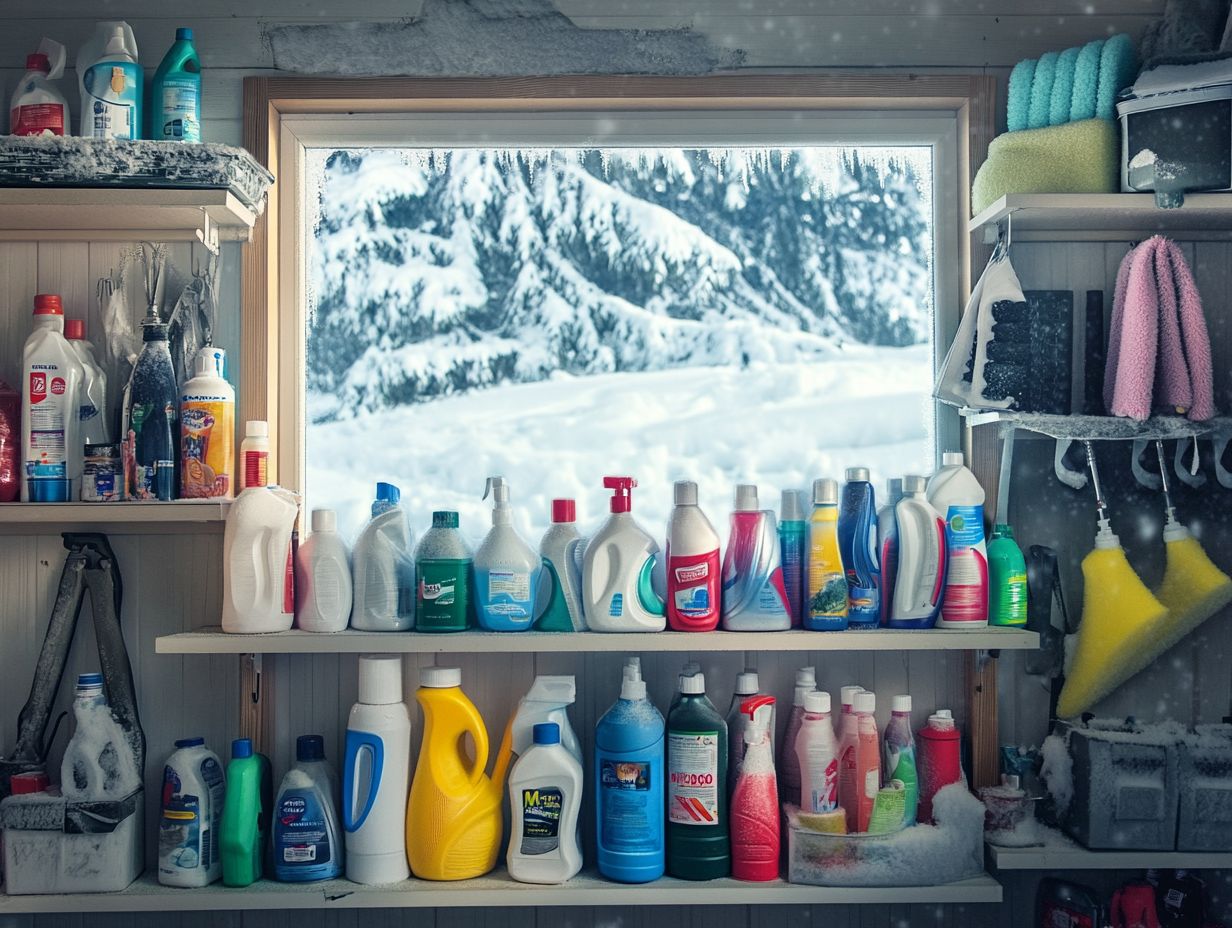
Storing your chemical cleaning products in a cool, dry place is essential for preventing degradation and ensuring they remain effective. Excessive heat or moisture can trigger chemical reactions that reduce their cleaning power or create potentially hazardous situations. Ideal storage spots include well-insulated garages or dedicated storage areas that protect against extreme temperature fluctuations during winter.
To create the optimal storage environment, aim for a temperature range between 50 F and 75 F. This range promotes both longevity and efficiency in your cleaning products. Keeping humidity levels low is equally important since dampness can accelerate decomposition and foster mold growth on packaging. A device that reduces humidity in the air, or a dehumidifier, can be a great addition to your storage area.
Using tightly sealed containers is highly recommended. If humidity is a concern, investing in a dehumidifier might be a smart move. For best results, consider how to store cleaning supplies on elevated shelves to protect them from potential floods or spills, while proper labeling will help prevent accidental misuse. This is particularly important in garage storage, where conditions can vary.
By taking these precautions, you ll create a safe and organized space for your chemical cleaning products. Start organizing your cleaning supplies today to ensure they work effectively!
3. Keep Away from Sunlight
Keeping your chemical cleaning products away from direct sunlight is crucial for maintaining their longevity and effectiveness. When exposed to sunlight, the chemical components in these cleaners can break down, diminishing their power over time. Use opaque storage containers or place them in shaded areas to mitigate this risk and preserve the quality of your supplies.
The ultraviolet rays in sunlight not only reduce cleaning efficacy but can also introduce potential safety hazards, as degraded chemicals may emit harmful fumes. To safeguard these products, store them in cool, dry places like cabinets or closets away from heat sources. Consider using cinder block storage areas for added stability and temperature control.
If you often reach for certain cleaning products, use clear labels on the containers for easy identification, ensuring they remain protected from light. Ensure that the lids are tightly sealed to prevent moisture from sneaking in, further extending the shelf life of your cleaners and maintaining their efficacy.
For optimal results, consider using cooler storage during temperature swings. Make it a priority to protect your cleaning products from sunlight!
4. Check for Expiration Dates
Make checking expiration dates on chemical cleaning products a priority to ensure you re using effective products for your cleaning tasks. Over time, these cleaners can lose their potency and fail to deliver the results you expect, which can compromise your cleaning efforts.
Regularly reviewing expiry dates allows you to replace or dispose of outdated products, helping you maintain a safe and efficient storage environment. Always incorporate these checks into your routine garage organization tasks.
This practice not only enhances the effectiveness of your cleaning routine but also cultivates a safer atmosphere, free from potentially harmful expired substances. To manage this effectively, keep an updated inventory of your cleaning supplies and other housekeeping products. Implement a labeling system that clearly displays expiration dates for each product, and establish a regular schedule to review and refresh your stock.
Utilize containers or shelves designated for different types of cleaners, making it easier to track what you have on hand and identify items that need replacing. By adopting these organizational tips, you not only streamline your cleaning process but also foster a responsible approach to maintaining the health and safety of your household and pets.
How to Store Natural and Chemical Cleaners for Winter?
Storing natural cleaners correctly during the winter months is essential for preserving their freshness and effectiveness. These eco-friendly products, typically crafted from natural ingredients like vinegar and baking soda, demand specific conditions to prevent spoilage. Likewise, proper storage of chemical cleaners and car care products like detail sprays is equally important to avoid any chemical reactions or degradation.
Opting for airtight containers will safeguard against moisture and contaminants, protecting the quality of your cleaners. Additionally, using these containers for detailing products in your garage can help avoid exposure to temperature swings. By doing so, you can ensure that they remain safe and effective for all your household cleaning tasks throughout the winter season. For more tips, check out this guide on how to safely store your eco-friendly cleaners.
1. Make Sure They are Stored in Airtight Containers
Storing your natural cleaners in airtight containers is essential for preserving their effectiveness and preventing spoilage. These containers act as a barrier against moisture, air exposure, and contaminants that could compromise quality over time. By ensuring that the lids are tightly sealed, you can keep your natural cleaning supplies in top condition and ready for use whenever you need them.
Choosing the right type of storage container can significantly enhance the longevity and potency of these eco-friendly formulas. Glass containers with rubber seals are particularly effective at maintaining freshness; they are non-reactive and won t leach harmful chemicals into your cleaners. Likewise, high-quality plastic containers designed specifically for storing cleaners will do the job well, as long as they are BPA-free and resistant to strong substances.
If you appreciate a visually appealing option, consider using amber or cobalt blue bottles. Not only do they protect the contents from UV light, but they also add a stylish flair to your cleaning supplies. Investing in sturdy, airtight containers will ultimately ensure effective use and safety for your household as you work to minimize the impact of harsh chemicals.
2. Store in a Cool, Dark Place
Store your natural cleaners in a cool, dark place to ensure they retain their cleaning properties and avoid degradation. Exposure to light and heat can alter the composition of those natural ingredients, making them less effective for your cleaning tasks. Therefore, it’s crucial to find an ideal storage location, like a basement or an insulated garage, to preserve these eco-friendly products. Similarly, proper garage storage for chemical cleaners can help avoid any safety issues arising from extreme temperatures.
Beyond basements and garages, consider using cabinets or closets that are shielded from direct sunlight and heat sources. It’s also smart to keep them in tightly sealed containers to minimize air exposure, which can impact their potency. A dedicated shelf in your pantry can be a convenient spot as long as it stays cool and dry.
Regularly monitor the temperature and humidity in these spaces; if they lean towards too warm or damp, using cooling packs or silica gel packs can further extend the life of your natural and chemical cleaners. Additionally, insulating garage spaces with an electric heater or blanket covering can help maintain a stable environment.
By taking these straightforward steps, you can ensure your eco-friendly cleaning solutions remain effective, allowing you to maintain a clean environment sustainably.
3. Label and Date Containers
Labeling and dating containers for your natural cleaners is crucial for maintaining effective organization and managing your inventory. By clearly marking each container with the product name and storage date, you can easily track their age and ensure you re using the freshest products available. This practice not only elevates your organization game but also reduces the chance of using outdated or ineffective cleaning supplies.
Employing a consistent labeling system can transform your cleaning routine, saving you time and minimizing frustration. Opt for waterproof labels or permanent markers to guarantee durability, particularly for containers stored in humid environments.
Consider utilizing color-coded labels to quickly identify different types of cleaners at a glance. To keep everything fresh, regularly review your inventory and discard or repurpose items that are nearing their expiry dates. By implementing these practical tips, you not only create a well-organized space but also cultivate a safe and eco-friendly cleaning environment.
What are the Safety Precautions for Storing Cleaners?
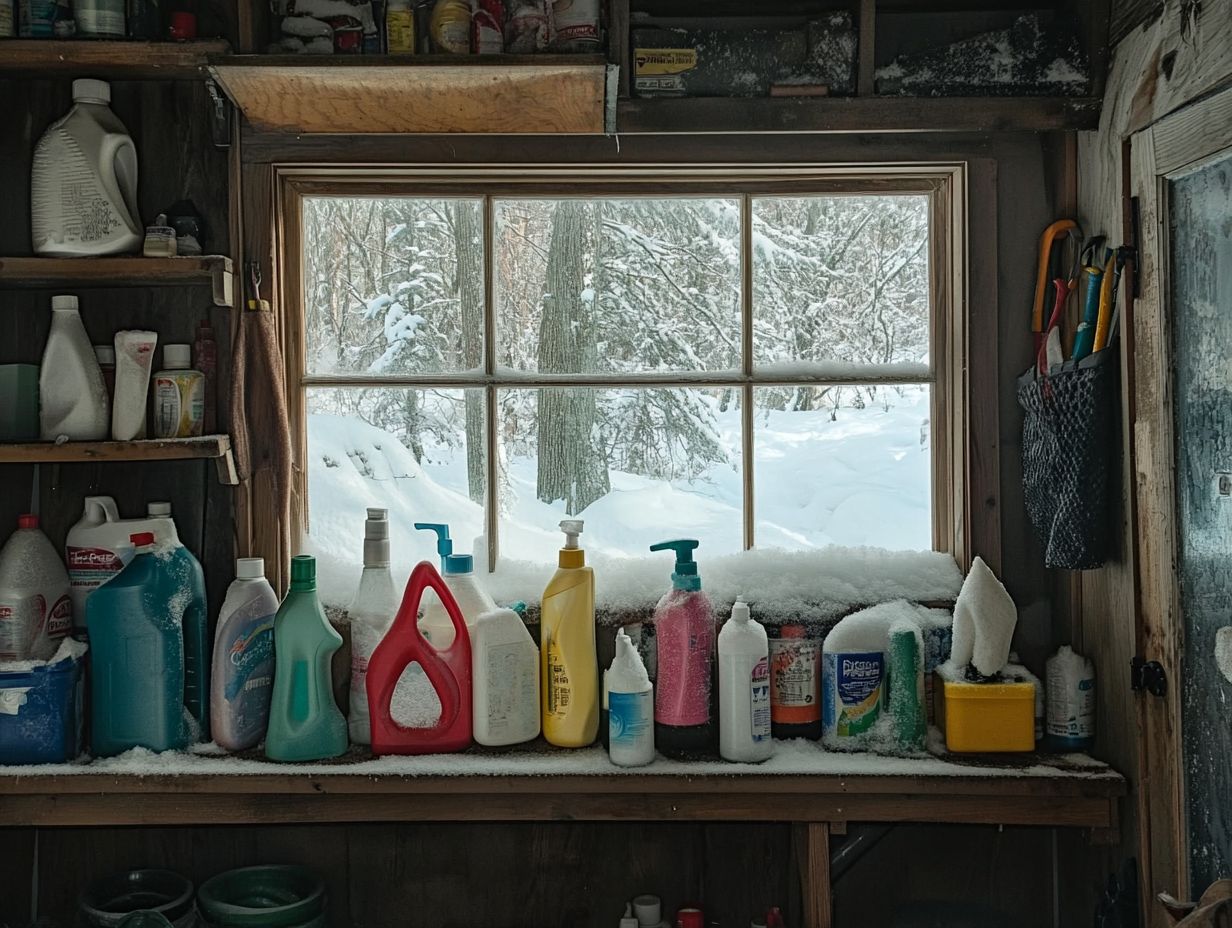
Ensuring the safety of your cleaning supplies, whether they are chemical or natural, is crucial to prevent accidents and health risks, especially in homes with children and pets. Follow specific storage recommendations for different types of products to avoid potential hazards.
Using good storage methods can significantly reduce risks. Ensure your cleaning products remain safe and secure in your home. Consider where you store them, the types of containers you use, and how you restrict access. All these factors contribute to a safe living environment.
1. Keep Out of Reach of Children and Pets
Keep cleaning supplies away from children and pets. This prevents accidental exposure or ingestion.
Many household cleaners contain hazardous chemicals that can pose serious risks. Remember, children and pets are naturally curious and may not fully grasp the dangers these products present.
Use practical storage solutions like locking cabinets, childproof latches, or high shelves to keep these potential toxins out of reach. Organizing cleaning supplies in designated areas, away from everyday activities, helps minimize accidents.
As a parent or pet owner, consider choosing eco-friendly alternatives whenever possible. Natural cleaning products often carry fewer risks while still being effective. This allows you to maintain a safe environment for your loved ones.
2. Wear Protective Gear when Handling Chemical Cleaners
Wearing protective gear when handling chemical cleaners is essential for safeguarding yourself against potential health hazards. Use gloves, goggles, and masks as your first line of defense. These items protect your skin and respiratory system from harmful substances often found in cleaning products.
By taking these precautions, you minimize safety risks during the usage or storage of chemical cleaners. This ensures a more secure and worry-free cleaning experience.
Specifically, nitrile gloves are recommended for their resistance to punctures and chemical exposure, making them an excellent choice for longer cleaning sessions. Protective goggles prevent irritation from splashes, especially when working with strong solutions.
When using products with strong fumes, you need respirators or appropriate masks to keep your airways clear of toxic vapors. Assess the specific cleaning agents in use and consult the safety data sheets (SDS) documents that provide important information about the handling and risks of chemical products for tailored advice on protective gear.
Incorporate these items into your cleaning routine to enhance personal safety and promote a healthier environment where strong chemicals are frequently utilized.
3. Do Not Mix Different Types of Cleaners
Mixing different types of cleaners can be a risky effort, leading to dangerous chemical reactions that create harmful fumes or toxic compounds, posing serious safety concerns. It’s essential for you to avoid combining chemical cleaners with natural ones and steer clear of products with incompatible ingredients. This can help prevent potential accidents. Always read labels and follow manufacturer instructions to ensure safe practices in your cleaning routine.
For example, combining bleach with ammonia releases chloramine vapors, which are highly toxic and can lead to respiratory distress. Also, while mixing vinegar with baking soda may seem harmless, their reaction produces carbon dioxide gas that can build up and cause pressure explosions in confined spaces. Consider checking YouTube or Google for safety videos and tips on proper handling and storage.
To use cleaners safely, work in well-ventilated areas, avoid using multiple products at the same time, and ensure that cleaners are stored properly, out of reach of children and pets. For more detailed guidance, you can learn how to store homemade cleaners safely. By staying vigilant and informed about the products in your cleaning arsenal, you can maintain a safe and efficient home environment.
How to Properly Dispose of Unused or Expired Cleaners?
Proper disposal of unused or expired cleaners is crucial for preventing environmental contamination and ensuring safety. By following local guidelines for disposing of chemical cleaners and understanding the correct disposal methods, you can significantly reduce the potential risks associated with hazardous waste.
Taking immediate action in your disposal practices protects your family and keeps your community safe! Additionally, proper disposal of cleaning supplies and housekeeping products prevents potential safety issues.
1. Follow Local Guidelines for Disposing of Chemical Cleaners
Following local guidelines for disposing of chemical cleaners is essential for ensuring safe and responsible waste management. Many municipalities have specific protocols for hazardous waste disposal, and adhering to these rules not only helps protect the environment but also mitigates potential risks. Always check your local waste management authorities for guidance on proper disposal practices and garage organization.
Navigating local regulations may seem daunting, but it s crucial for community safety and ecological health. You can often find valuable information on your city or county’s official website, which typically outlines the types of hazardous materials accepted and the recommended disposal methods.
To identify hazardous waste, look for labels indicating corrosive (can cause damage to skin or materials), toxic (poisonous), or flammable (can catch fire easily) characteristics on cleaning products. Staying informed and compliant not only prevents environmental harm but also helps you avoid fines for improper disposal. Familiarizing yourself with these local guidelines and resources is a responsible choice for both you and your community. Consider how extreme temperatures can affect cleaning product tips and the efficacy of your supplies.
2. Consider Donating Unused Cleaners to Local Organizations or Shelters in Ohio
Donating your unused cleaners to local organizations or shelters is a responsible choice. It s a chance for you to make a real difference while keeping those products out of landfills.
Many shelters and community organizations actively seek cleaning supplies to support their operations. This offers you a wonderful opportunity to assist those in need while reducing waste. Always check with the organization to confirm that your products are safe and suitable for donation. In Ohio, shelters might have specific needs or restrictions for accepting donations.
By taking this step, you re not only contributing to your community s well-being but also championing a more eco-friendly method of waste management. To find suitable charities, start by exploring local shelters, food banks, and community outreach programs. You can use online platforms and social media to identify these organizations.
Make sure your cleaners are unopened and within their expiration dates. Some agencies may have specific regulations about accepting household products. Opting for eco-friendly products can further enhance the positive impact of your contribution, especially if they include natural ingredients like vinegar and baking soda.
3. Use Up Natural Cleaners for Household Cleaning, Whether in the Garage or Laundry Room
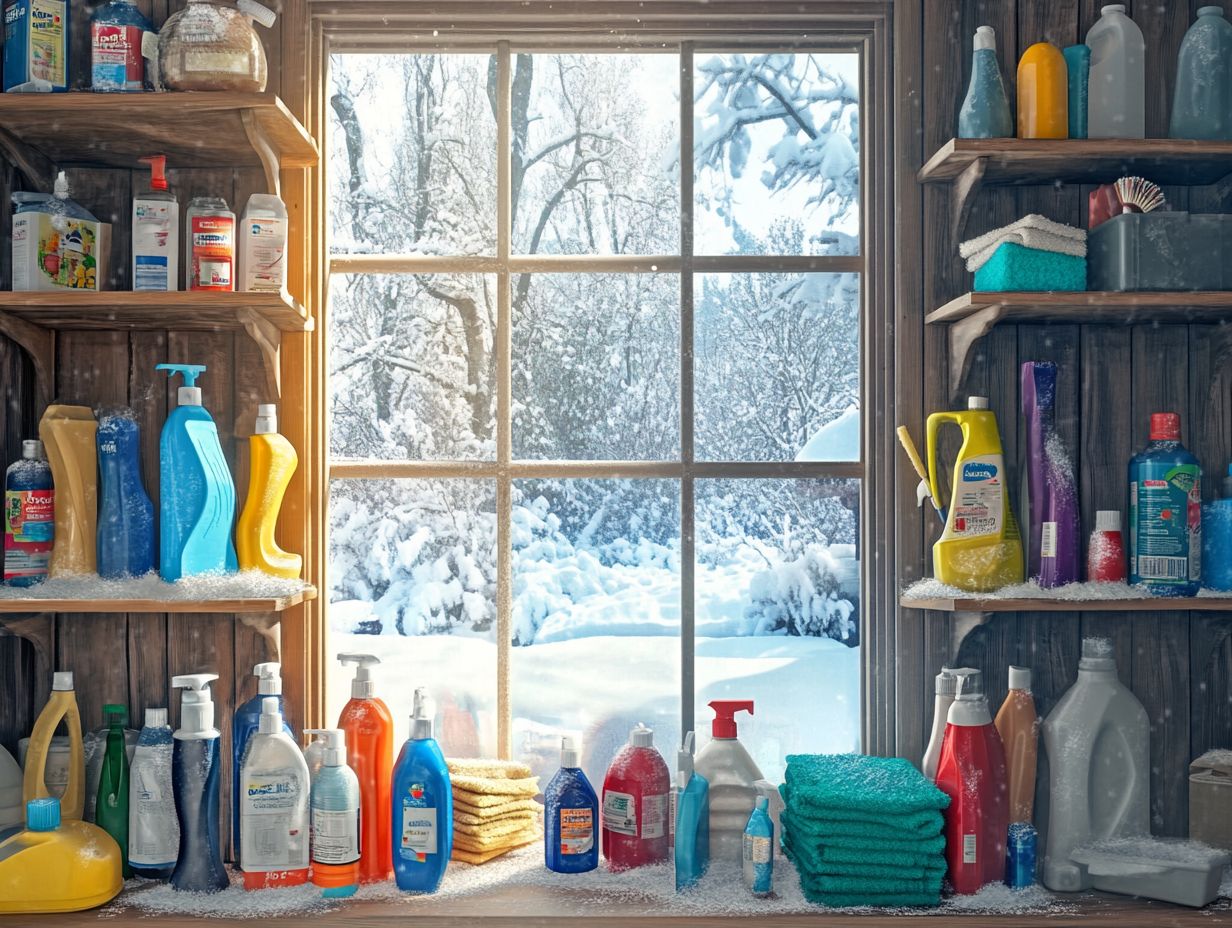
Using natural cleaners for your household cleaning minimizes waste and ensures you re choosing safe and effective solutions. Many natural cleaners have a longer shelf life, making them a smart addition to your routine.
By regularly incorporating these products, you can use them before they expire to keep your home fresh and healthy. This applies whether you re cleaning in the garage, basement storage, or laundry room. This approach not only promotes sustainability but also enhances the overall effectiveness of your cleaning efforts.
To seamlessly integrate natural cleaners into your habits, start small. Replace one chemical product at a time with its natural alternative. For example, switch out your store-bought bathroom cleaner for a simple yet powerful solution of vinegar and baking soda to tackle grime and soap scum. Keep a spray bottle filled with diluted essential oils nearby for a pleasant scent while you clean. Using detail sprays and Wolfgang sealant can enhance the longevity and effectiveness of your car care products.
Consistency is key. As you make these gradual changes, you ll find that you re benefiting your home and nurturing a more eco-friendly lifestyle. Consider implementing these changes in various parts of your home, including garage storage, to maintain an organized and sustainable environment.
Don t miss out on more great tips! Check out related YouTube channels and videos for additional advice.
Frequently Asked Questions
What is the best way to store cleaners for winter?
The best way to store cleaners for winter is to label them clearly before storage. Keep them in a cool, dry place like basement storage or cooler storage. Also, ensure they are out of reach of children and pets. Avoid storing cleaners near heat sources or direct sunlight.
Can I store all types of cleaners together for winter?
No, it is not recommended to store all types of cleaners together for winter. Certain chemicals can react with each other, causing dangerous fumes or explosions. Store cleaners separately based on their type to avoid reactions, and use storage containers in the garage or basement to keep them organized.
How do I ensure my cleaners are still effective after being stored for winter, especially in the garage?
To ensure your cleaners are still effective after winter storage, check the expiration dates on the packaging. If the expiration date has passed, dispose of the cleaner and purchase a new one. Always follow the directions on the packaging for proper storage and usage. Be mindful of temperature swings that could compromise the products.
What should I do if a cleaner freezes during winter storage?
If a cleaner freezes during winter storage, it is best to discard it. Freezing can alter the chemical composition of the cleaner and make it less effective or even dangerous to use. It is better to be safe and replace the cleaner with a new one. Consider insulating your garage or using a blanket covering to prevent this issue.
Are there any special precautions I should take when storing cleaners for winter, including car care products like Tesla Model 3, CX-30, or Toyota Corolla?
Yes, when storing cleaners for winter, it is important to make sure the containers are tightly sealed to prevent any leakage or spills. It is also recommended to store cleaners in a plastic bin or tray to contain any potential spills. Always keep cleaners out of reach of children and pets. For additional safety, consider organizing supplies in a dedicated storage area like a garage or basement.
How often should I clean and organize my cleaners during winter storage?
It is recommended to clean and organize your cleaners at least once a month during winter storage. This will help keep track of any expired or damaged cleaners and ensure they are stored properly. It will also make it easier to access and use the cleaners when needed. Regularly organizing supplies can also help identify potential storage issues and improve overall garage organization.

